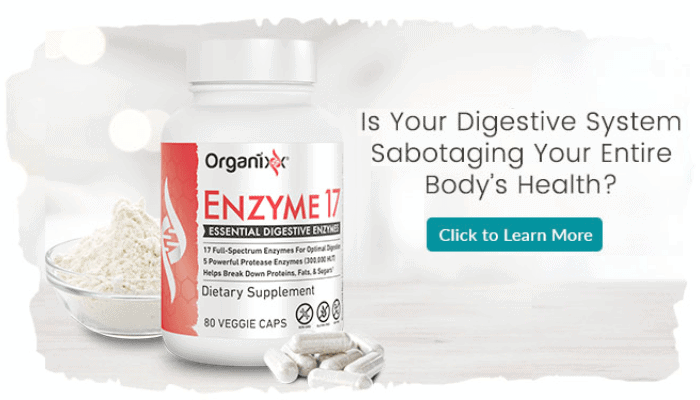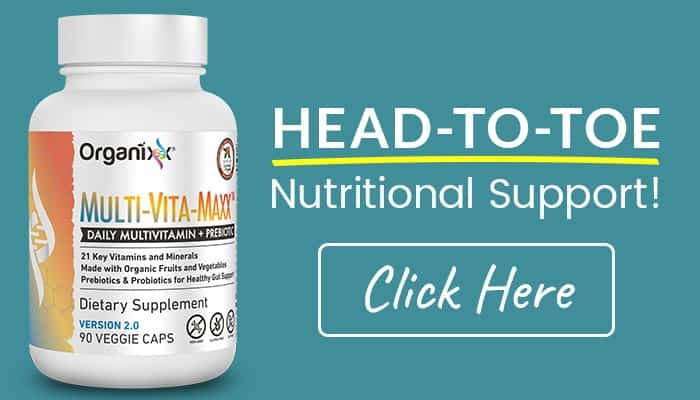Video Transcript:
Today, I want to talk to you about how to optimize health for men, and this is a really important topic because a lot of men rely on their partners, their spouses, to give them advice and tips on what supplements to take. Often, we as women in our households are supplying our gentlemen with supplementation.
Support Your Healthy Habits
So today, I’m going to offer some advice for any of you ladies who want to power up and support your male partner’s health and enhance their wellness, as well as any of you gentlemen looking for some basic guidance to help support your overall health. And this is going to really support and supplement any of the good, healthy lifestyle habits and maybe current lifestyle changes you’re implementing where you’re eating healthy foods, maxing out your sleep, and lowering your stress.
Address Nutritional Deficiencies
So, the first and most important thing for men to consider taking is a whole-food, plant-based supplement, and this is really, really critical because the multivitamin that has a good amount of bioavailable, plant-based nutrition can really create a foundational piece where you get a lot of the daily requirements of your nutrients, and a lot of health issues, when we look at aging and degeneration within the body, a lot of our problems or challenges ultimately come back to nutrient deficiencies.
So, I’m very excited to recommend the Multi-Vita-Maxx. This is our plant-based, powerful multivitamin. You’re going to get all of the required daily requirements of both your vitamins as well as key minerals like magnesium, and zinc, and chromium, which is really important for gentlemen looking to balance their blood sugar levels. I also like that this is a fermented form of a multivitamin, which enhances the bioavailability of this nutrition.
Get the Gut Healthy
Now, the second thing that’s really important is for gentlemen to support their gut health. We have a term that we reference to the balance of bacteria in the gut, and we call it the microbiome. That’s an assortment of bacteria that we want to be balanced and we want it to be very plentiful and very similar to like a coral reef – we want to have multiple types of bacteria that create this kind of rainbow cascade of good bacteria that balances our body.
And in one of my masterclasses, I host masterclasses every month, I have one of my masterclasses that digs into mastering your gut health and ultimately supporting your gut microbiome. One of the things I share in that class is that the microbiome, our microbes, the actual bacteria, enhances our hormone levels and it can actually influence our immune system and it can influence the inflammatory response in the body.
So, for any gentlemen who might be dealing with diabetes, or gout, or liver imbalances, maybe elevations in cholesterol and triglycerides, or even gentlemen who might be dealing with prostate imbalances, it’s really important for us to look at adding a good probiotic.
And we have ProBiotixx+, which is a very powerful form of L. plantarum, which we know is one of the super plentiful bacteria types that can help culture and rebalance your gut. So, making sure you get a good probiotic can be very beneficial in enhancing your overall gut health, which can balance your digestive grievances like IBS, or CIPO, or gas and bloating after consuming a meal, but it can also power up our brain health and balance our hormones.
Combat Inflammation to Prevent Illness & Disease
Now, another thing that is really important for men is to address inflammation. Ultimately, inflammation is the root of all illness and disease within the body, and systemic inflammation is something we need to combat. And signs or symptoms of inflammation can be swelling, it can be elevations in enzyme levels like our ALT and AST – those are labs that identify enzyme levels in our liver. We will present with hormone imbalances. Men will have elevations in prostate markers like PSA will be elevated or experience benign prostatitis. Other individuals might experience heart disease. And so rooted behind all of these illnesses and diseases is ultimately inflammation. Our cells, our cytokine process is overwhelmed and heightened, and there are really two ways that I use some supplementation here to combat inflammation.
The first thing is magnesium, a very well-balanced, multi-magnesium, like we have Magnesium 7. This can be really helpful in minimizing inflammation that gentlemen experience in their joints. Maybe you have joint pain, or osteoarthritis, or rheumatoid arthritis, and even gout.
Swelling is a byproduct of inflammation. So, if you notice you’re holding more fluid, Magnesium 7 is what I recommend. I’m kind of an expert in the swelling category, I’m specialized in lymphatic therapy, which is all about moving the excess fluid in the body. We use magnesium to flush fluid out of the body and it will flush fluid through the kidneys and bladder and you might notice a reduction in fluid retention of upwards of three to five pounds on the scale. So, Magnesium 7 is great for lowering your inflammation levels.
Address the Reduction in Stomach Acid & Enzymes As We Age
And then, last and final is at the age of 30, for all of us, men and women, we have a reduction in stomach acid levels and we start to notice that the pancreas is not producing enough digestive enzymes. That ends up leading to digestive grievances, imbalances in our digestive process, an inability to digest our food, assimilate the nutrients, and power up the body. That can also lead to constipation, and leaky gut, and gut-brain, gut-heart, gut-thyroid imbalances.
So, one of the best ways to combat this lowered stomach acid level and a reduction in digestive enzymes that your pancreas is producing – which by the way can often be an undercurrent for diabetes – Enzyme 17 is something you want to add to your daily practice and this is something where you take two of these supplements, about 20 to 30 minutes before you consume a meal.
Enzyme 17 is one of the most plentiful enzyme blends that is out there on the market. It’s one of my favorite products we have here at Organixx, and it can help your body digest and break down the assorted macro and micronutrients that you need to support your body.
Additionally, here is a bonus tip that I tell all my patients. If you are dealing with any inflammation, or maybe you have digestive imbalances you notice. Maybe there are food particles that you’re passing in your bowel contents. Enzyme 17 is something you can take at night on an empty stomach and it will help reduce the digestive grievances and will help clear up systemic inflammation.
So, that’s a little bonus tip, but overall, these four items are going to be very helpful in supporting overall men’s health, and are basic foundational elements that every gentleman should add to his daily supplement regimen. So, that’s my tip for you and I hope you share that with any of the gentlemen in your life. And gentlemen, if you have any questions about health and wellness, make sure you comment and hit that reply button and I will be taking questions and answering them in future videos.
Organixx Enzyme 17 contains a whopping FIVE kinds of powerful protease enzymes in combination with one of the most advanced enzyme blends on the planet. It’s scientifically designed to help your body break down and process nutrients for better absorption, digestion, and overall health.
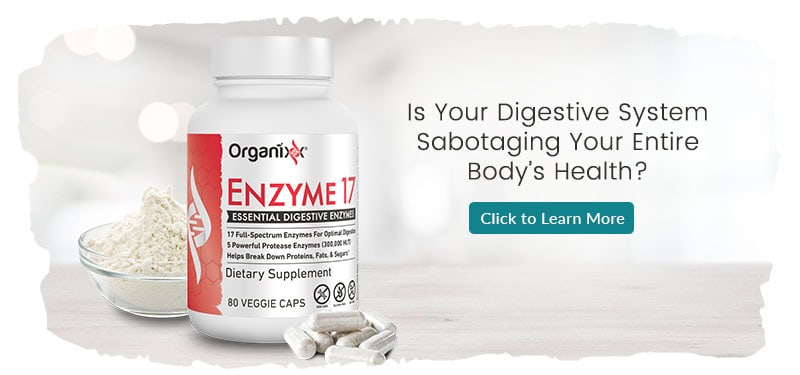
Can I Take Collagen And Multivitamins Together?
Well, many people are looking for ways to improve their overall health, and one way to do this is by taking collagen supplements. Collagen is a protein that is found in the skin, bones, and connective tissues, and it plays a vital role in maintaining the structure of the body.
Some people may wonder if they can take collagen and multivitamins together. In this guide, we’ll explore the potential benefits and risks of taking collagen supplements in combination with multivitamins.
What exactly is collagen?
Before we take a look at combining the benefits or risks of combining collagen and multivitamins, it’s important to first understand what collagen actually is. Collagen is a protein that can be found in various parts of the body. It plays an important role in maintaining the structure and integrity of these areas, as well as keeping them functioning properly.
Can I take collagen and multivitamins together?
Now that we have a better understanding of what collagen is, let’s take a look at whether or not it’s safe to take collagen and multivitamins together. There’s no definitive answer to this question, as there are certain vitamins which can pair with collagen and others that should be avoided.
What vitamins and minerals are great with collagen?
There are a handful of vitamins and minerals that can complement collagen supplements and can help to promote overall health. Some of these include:
Vitamin A
One of the key vitamins when it comes to collagen is vitamin A. Not only does it aid in collagen production, it can also help to improve the appearance of wrinkles and other signs of aging. Adding Vitamin A-rich foods like leafy greens, carrots, and sweet potatoes or a Vitamin A supplement can help to improve collagen production.
Vitamin C
Vitamin C is another important vitamin for collagen production and can be easily incorporated into your diet by way of foods or supplements. Vitamin C has been shown to stabilize collagen mRNA, which is necessary in order for collagen to properly synthesize for the repair of damaged skin.
Zinc
Another way to increase the benefits of collagen supplements is by increasing the amount of zinc in your diet. Zinc is a nutrient which is found in our bodies and aids the immune system as well as metabolism functions. From healing wounds to being a factor in our sense of taste and smell, Zinc also is a cofactor in the production of collagen. Playing a vital role in collagen synthesis, Zinc is known to activate a protein called collagenase which allows cells in your body to remodel collagen when attempting to heal lacerations.
L-Arginine
One other vitamin or supplement that can be taken along with collagen supplements is L-Arginine, which can help to increase blood flow and can aid in collagen production. Many foods such as red meat, poultry, nuts, and seeds contain L-Arginine, making it easy to incorporate into your diet.
Whey Protein Powder
Adding a whey protein powder can also help to increase collagen production in the body. Whey protein is a highly bioavailable source of protein, which can be easily digested and absorbed into the body.
Hyaluronic Acid
Finally, Hyaluronic acid can be used in conjunction with collagen which can improve hydration and can help to reduce the appearance of wrinkles. A naturally occuring substance, the amount of Hyaluronic acid begins to decrease as we age. Hyaluronic acid provides a moisture-rich setting in which collagen is able to stretch without breaking–or in other words, provides your skin with elasticity.
What vitamins and supplement combos should I avoid?
While there are numerous vitamins and minerals that can complement collagen supplements, there are also some that can counteract their effects. Some examples of vitamins or supplements to avoid when taking collagen include:
Calcium and Magnesium
While both calcium and magnesium are essential for bone health, they can actually have a negative effect on collagen production. This is because they can compete with each other for absorption in the gut, which can lead to deficiencies in either or both of these minerals. Additionally, collagen can raise levels of calcium and lead to something that is known as hypercalcemia which symptoms include nausea, constipation, fatigue and vomiting.
Copper and Zinc
Copper and zinc are two important minerals that are required for the production of collagen. However, taking supplements that contain high levels of these minerals can actually have a negative impact on collagen production. When taken in large amounts, copper and zinc can interfere with the body’s ability to process vitamin C, which is essential for collagen synthesis. In addition, high levels of copper and zinc can promote the formation of harmful free radicals, which can damage skin cells and lead to premature aging.
Fish oil and Ginkgo Biloba
Fish oil supplements are a great source of omega-3 fatty acids, which have numerous benefits for the skin. However, taking fish oil supplements can actually decrease the amount of collagen in the skin. This is because omega-3 fatty acids can interfere with the body’s ability to produce collagen. In addition, ginkgo biloba supplements can also have a negative impact on collagen production. This is because ginkgo biloba can inhibit the activity of an enzyme called collagenase, which is responsible for breaking down collagen.
Iron and Green Tea
Iron can also have a detrimental effect on collagen production. This is because high levels of iron can actually lead to the formation of free radicals, which can cause damage to skin cells and contribute to premature aging. Similarly, green tea can decrease collagen levels in the body due to its antioxidant properties.
Melatonin and St. John’s Wort
Melatonin can negatively impact collagen production as it can interfere with collagen synthesis and can actually cause the breakdown of certain components of your skin tissues. In addition, St. John’s Wort can decrease the amount of vitamin C in the body, which can lead to decreased collagen levels and weakened skin cells.
Red Yeast Rice and Niacinamide
Red yeast rice can have a number of negative effects on collagen production. This is because it can increase the levels of cholesterol in the body and can actually stem cellular repair. Additionally, niacinamide can also decrease collagen levels in the skin and can lead to the breakdown of certain components of your skin tissues.
Vitamins A, D, E vs. Vitamin K
Vitamin A can have a number of negative effects on collagen production. It can actually increase the levels of free radicals in the body, damaging skin cells and can lead to premature aging. In addition, vitamin D can also decrease the amount of collagen produced by your skin cells, while vitamin E can promote the breakdown of collagen and disrupt the production of new collagen fibers.
However, vitamin K can actually help to promote collagen synthesis and can protect your skin from the damaging effects of free radicals. As such, it is important to take a variety of different vitamins in order to maintain healthy collagen levels.
Potassium and Calcium
Potassium and calcium are two minerals that are essential for the production of collagen. However, taking supplements that contain high levels of these minerals can actually have a negative impact on collagen production. Potassium and calcium can compete with each other for absorption in the gut, which can lead to deficiencies in either or both of these minerals. Additionally, high doses can also lead to unwanted side effects, such as nausea, fatigue and digestive issues.
Vitamin C and Vitamin B12
Vitamin C is a big part of collagen production, but taking large doses of vitamin C can actually have a negative impact on your natural production. This is because vitamin C can interfere with the body’s ability to process copper, which is necessary for collagen synthesis. Additionally, vitamin B12 can also have a negative impact on collagen levels as B12 can actually inhibit the activity of collagen-producing cells and can disrupt collagen synthesis.
What else do I need to know regarding taking collagen supplements?
It’s important to note that there are a number of different factors that can impact collagen production. Here are a few things you should know before you start taking collagen supplements:
You can take collagen in different forms
There are a number of different ways to take collagen supplements in order to reap their benefits. You can take collagen in pill form, you can add collagen powder to your food or drinks, or you can use collagen creams and lotions.
Collagen supplements have different levels of quality
When you’re looking for collagen supplements, it’s important to choose a high-quality product. The quality of the collagen can impact its effectiveness so make sure to look for collagen that is derived from grass-fed, pasture-raised animals and that has been hydrolyzed into smaller peptides for easy absorption.
You can also get collagen from food sources
Diet and nutrition play such an important role in our lives and should come as a top priority, whether you take vitamins and supplements or not. In addition to taking collagen supplements, it’s important to get plenty of collagen-rich foods in your diet. Some good sources of collagen include grass-fed meat and poultry, bone broth, eggs, and fish such as salmon and sardines.
Timing matters
If you’re looking to get the most out of your collagen supplements, timing can play an important role. For best results, make sure to take your collagen supplement at least 30 minutes before eating or 2 hours after a meal. This can help ensure that the collagen is properly absorbed into your body and can give you the most benefit.
Key Vitamins and Minerals Your Body Needs
There are a number of different vitamins and minerals that can help to promote healthy collagen levels in your body. To reap the most benefits from your collagen supplements, it is important to make sure that you get enough of these key vitamins and minerals in your diet. This can be done easily by following a well-balanced, healthy diet that includes plenty of fruits, vegetables, and whole foods.
Here are some of the key vitamins and minerals your body needs:
Vitamin B1 (Thiamine or Thiamin)
Vitamin B1, also known as thiamine or thiamin, is a water-soluble vitamin that is essential for the function of our bodies. It’s involved in a number of different biochemical processes, including the production of energy and the metabolism of proteins, carbohydrates and fats. Additionally, vitamin B1 plays a key role in collagen production, helping to maintain the structure and function of your skin.
Vitamin B2 (Riboflavin)
Vitamin B2, or riboflavin, is another important water-soluble vitamin that can help to promote healthy collagen levels. Vitamin B2 can help to support the production of collagen and can also protect against oxidative stress and damage from free radicals.
Vitamin B3 (Niacin)
Vitamin B3, also known as niacin, can be found in a variety of food sources. Vitamin B3 is important for the proper function of our bodies, helping to support energy production and overall metabolism. It can also help to maintain healthy collagen levels and can protect against DNA damage.
Vitamin B6
Like the other B vitamins, vitamin B6 is an important nutrient that can help to promote healthy collagen production in your body. Vitamin B6 can help to support protein metabolism and can also protect against oxidative stress. Additionally, it can play a key role in collagen synthesis and can assist with the formation of skin proteins.
Vitamin B12
Vitamin B12 is very similar to vitamin B6 in that it can also play a vital role in collagen production and can help to promote healthy skin function. It can also protect against oxidative stress and can support the synthesis of amino acids, which are important building blocks for collagen.
Vitamin C
Vitamin C is a powerful antioxidant that can help to reduce oxidative stress and can play a role in collagen synthesis. Vitamin C can also help to support healthy connective tissue by increasing collagen levels within your body. This can help keep your skin looking youthful and can help to improve your overall health.
Calcium
Calcium is a mineral that is essential for the health of our bones and teeth. It’s also important for the function of other tissues and organs in our bodies. In addition to taking collagen supplements, it’s important to make sure you’re getting enough calcium in your diet. Some good sources of calcium include dairy products such as milk, yogurt and cheese, as well as leafy green vegetables, tofu and certain types of fish.
Chromium
Chromium is another important mineral that can help to support healthy collagen production in your body. It can also play a key role in maintaining blood sugar levels and can help to reduce oxidative stress. Some good food sources of chromium include egg yolks, potatoes and oysters.
Vitamin D
Vitamin D is an important vitamin that can help to promote healthy collagen levels. This essential vitamin can also help to support the absorption of calcium, which is essential for healthy bones and teeth. Additionally, vitamin D can help to reduce inflammation and can protect against oxidative stress.
Vitamin E
Vitamin E is a powerful antioxidant that can help to reduce inflammation and can support healthy collagen production in your body. Vitamin E can also protect against oxidative stress, helping to maintain the structure and function of your skin. You can find vitamin E in a variety of different food sources including nuts, seeds, eggs and avocados.
Folic Acid
Folic acid is a water-soluble vitamin that can help to promote healthy collagen production in your body. Folic acid can also play a role in DNA synthesis, helping to maintain the structure and function of your cells. You can find folic acid in a variety of food sources including leafy green vegetables, legumes, nuts and seeds.
Vitamin K
Vitamin K is an important vitamin that can help to support healthy collagen production in your body. Vitamin K also plays a role in bone health and can help to reduce the risk of osteoporosis. Additionally, vitamin K can help to protect against oxidative stress and can improve the elasticity of your skin.
Iodine
Iodine is an essential mineral that can help to promote healthy collagen production in your body. Iodine can also play a role in thyroid function and can help to protect against oxidative stress. Some good food sources of iodine include seafood, seaweed, eggs and dairy products.
Iron
Iron is an important mineral that is essential for the health of our bodies. It can help to support a variety of different functions in our bodies, including collagen production. Iron can also play a role in energy production and can help to reduce inflammation. Some good food sources of iron include meat, poultry, fish, legumes and nuts.
Magnesium
Magnesium is another mineral that can be found in a variety of food sources. It’s involved in over 300 biochemical reactions in our bodies and can help to support a number of different functions. Magnesium can help to promote healthy collagen levels and can also assist with the production of new collagen fibers. Additionally, it can help to protect against oxidative stress and can support healthy skin function.
Potassium
Potassium can also be found in a variety of foods, and it can help to promote collagen production. Potassium can assist with the synthesis of proteins that are important for healthy skin function and can support the health of your connective tissue. Additionally, it can help protect against oxidative stress and can support overall health.
Selenium
Selenium is a trace mineral that can be found in a variety of food sources such as fish, meat, poultry and eggs. It’s an important nutrient that can help to support healthy collagen levels and can also assist with the production of new collagen fibers. Selenium also helps to protect against oxidative stress and can play a role in DNA repair.
Zinc
Zinc is another essential mineral that can promote collagen production by acting as a cofactor for enzymes involved in collagen synthesis. Getting enough zinc in your diet can help support healthy, vibrant skin and can help to preserve the structural integrity of your connective tissues.
In Conclusion
Collagen is an important protein that can provide a number of benefits for our health. At the same time, multivitamins also offer a range of important nutrients that can help to support collagen production and promote overall health. With the right diet and supplementation, and the correct pairing of minerals and vitamins, you can support optimal collagen production and enjoy youthful, glowing skin!
For more information, check out our other informative posts, podcasts, and browse our selection of premium collagen supplements!
Organixx Clean Sourced Collagens blend contains five types of collagen from four sources. What’s more, it’s combined with targeted nutrients such as zinc, vitamin C, and vitamin B6 which specifically enhance the bioavailability and potency of collagen. Clean Sourced Collagens is formulated from the ground up to enhance and support your body’s natural ability to heal and rebuild itself from the INSIDE out.

Video Transcript:
Today, I want to talk to you about choosing the right multivitamin for your daily nutritional supplementation. I get asked by a lot of patients whether they should take a daily vitamin, a multivitamin. My answer is nuanced because it really depends on the type of vitamin, the form of nutrition or nutrients, vitamins, and minerals, and coenzymes and co-factors that are going to be in the supplement, and it also depends on whether it’s food-based or if we’re dealing with synthetic nutrients.
Always Choose Whole-Food-Based
I want to share with you why I like the Multi-Vita-Maxx. This is a whole-based, a plant-based multivitamin that is going to deliver powerful nutrition via fermented ingredients. Let’s talk a little bit about this. You’re going to get 21 unique fermented nutrients, and they are whole plant-based food items that we can open up via the fermentation process. The nutrients, we can get access to vitamin A, and vitamin E, and vitamin D, and then a whole assortment of critical nutrients.
That, in a synthetic version, what I find is a lot of patients actually are dealing with malabsorption or just completely missing the boat on the methylation process within their body and not able to consume those nutritional aspects in the multivitamin. When you are looking for a multivitamin, it’s very important that you look for a whole-food-based multi. What I want to share with you is often you’ll have on the back, so kind of label reading, if you will, is what you want zero in on.
Getting the Facts Straight
You’ll usually have a supplement fact, the element here on the back part of the label. The front is going to be the label, and then the back is going to be supplement facts. If there is not a supplement facts on the back, you do not want to consume that product. That’s number one. There are a lot of multi-level marketing brands that won’t even be transparent about what’s inside the product. That’s step one.
Step two, then you want to assess what nutritional aspects. You want to look for a vitamin A that is a beta carotene source, meaning it’s coming from foods that are going to contain beta carotene – those are yellowy, orangey foods like carrots. And then you’re going to look for a certain type of vitamin A or vitamin E, certain B1 or B2 types. And then you’re also going to be looking at having some magnesium and some other minerals in your mix.
But there will usually be in a whole-food supplement multivitamin, you’re also going to have a whole list of what we call botanical or food-based blends, where we’re deriving all those nutritional aspects from. For instance, in the Multi-Vita-Maxx, there’s a whole segment, it’s organic fermented botanical blend, and that’s 1,080 milligrams of things like organic alfalfa juice powder, organic spinach powder, organic sprouted purple maze, and organic broccoli powder.
That will also deviate or indicate to you that you’re dealing with a whole-plant-based nutritional multivitamin. A synthetic, which is usually what you’re going to find at your drug store, your big box stores like Costco, Walmart, even Target, they’re going to be carrying brands like Centrum, which is a very common consumed multivitamin that literally is not even able to be broken down by your stomach acid and ends up kind of taking root sometimes in the intestinal folds. I’ve seen a ton of folks that when we’re doing scans of their abdomen actually have little particles of these undigested multivitamins.
Filling Nutritional Gaps
When you’re choosing a multivitamin, search for a multivitamin that is going to be whole-food-based, that is going to be plant-based, and that will actually deliver the right nutrition to help fill in what I call nutritional gaps. I love to recommend the Multi-Vita-Maxx. I like to recommend Multi-Vita-Maxx because there are eight organic superfoods and botanicals along with whole-based nutrition.
This is great for supporting your immunity. It’s great for your brain health. It’s really great for your digestion. Overall, this is a good adjunct to eating a healthy diet. No amount of whole-based organic fermented multivitamins are going to replace the need for a good, healthy, organic diet rich in nutrients, rich in colorful foods, mostly vegetables, some fruits, and then seeds, and good healthy fats.
Use a multivitamin like Multi-Vita-Maxx as a nutritional gap resource and choose a more fermented version, which helps open up the bioavailability. For a lot of patients that have sensitive stomachs or find that they burp when they consume a multi or find that digestively they’re not assimilating well, choosing a plant-based fermented multivitamin is the way to max out the absorption. I’m excited to share this tip with you. I hope you find it helpful, and I hope you reach for a multivitamin like Multi-Vita-Maxx.
If you’re not getting all the nutrients and antioxidants you need from food, your best source is whole food vitamins. Organixx Multi-Vita-Maxx contains 21 uniquely fermented vitamins and enzyme-activated minerals that are more “bioavailable” and easily absorbed by your body than the synthetic compounds found in most supplements.
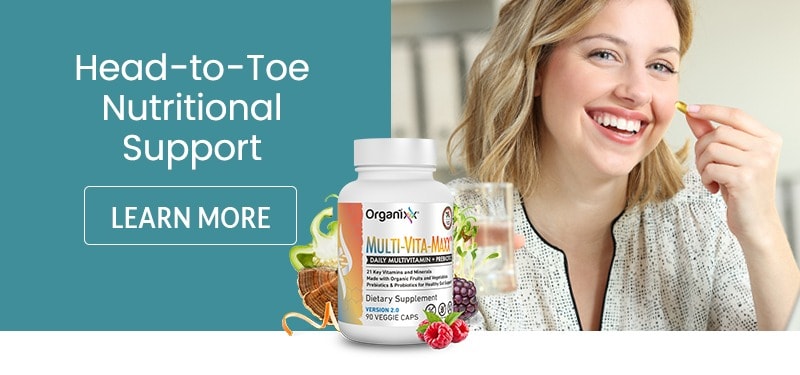
Would it surprise you to know that multi-vitamins are the most common dietary supplement used in the U.S., consumed by nearly a third of all adults? When the average person adds a nutritional supplement to their diet, a multivitamin is likely to be the first choice, because it feels to them like they’re taking out “insurance” on their health.
Traditionally, a daily multivitamin is meant to prevent nutritional deficiency. The specific combination of essential vitamins and minerals in these supplements is deliberately designed to resemble healthy diet patterns, specifically that of regular fruit and vegetable consumption.
It’s not just the average Joe and Jane though that take multivitamins.
Professional healthcare providers believe in dietary supplements too. In an online survey, 900 physicians and 277 nurses were asked whether they used dietary supplements and whether they recommended them to their patients.
The “Life…supplemented” Healthcare Professionals Impact Study (HCP Impact Study) reported that 51% of physicians and 59% of nurses surveyed used dietary supplements regularly to maintain their overall health and wellness [1].
When asked whether they recommended dietary supplements to their patients, 79% of the physicians and 82% of nurses surveyed said they did [1].
Clearly, there’s something to be said for the multivitamin approach to help ward off nutrient deficiencies!
However, as an educated consumer, what should you know about commercially available multivitamins on the market today and their potential effects on your health?
Let’s take a look at 5 important issues you should consider when selecting a suitable multi-vitamin to fulfil your health needs.
Fact #1: Research Shows Fruits & Veggies Lower Risk of Disease and Death
 In an ideal world, we would get all the micronutrients we need – both vitamins and minerals – in the right quantities from the fruits and vegetables in our diet.
In an ideal world, we would get all the micronutrients we need – both vitamins and minerals – in the right quantities from the fruits and vegetables in our diet.
Indeed, many studies have linked regular consumption of fruit and vegetables with a significantly lower risk of dying from all causes [2].
Lowered Risk of Dying From Cardiovascular Disease
For instance, the results of a 2014 meta-analysis of 16 prospective cohort studies showed that each daily increment of one serving of fruit or vegetables (up to five servings daily) lowered the risk of dying from all causes, especially from cardiovascular disease [3].
[Note: A “meta-analysis” uses a statistical approach to combine results from multiple studies to increase statistical “power” relative to individual studies, improve estimates of the size of the effect, and/or to resolve uncertainty when reports disagree. A “prospective study” keeps watch on a so-called “cohort” of subjects over a fixed period and waits for specific outcomes, such as the development of a disease – and tries to relate this to other factors, such as suspected risk or protection factors.]
Reduced Risk of 5 Types of Cancer
The European Prospective Investigation into Cancer and Nutrition (EPIC) study is another prospective study that examined the relationship between consumption of fruits, vegetables, and fiber, and cancer risk at 14 different sites in the body.
In the more than 500,000 study participants, increased intake of fruits, vegetables, and fiber was seen to reduce the risk of upper gastrointestinal tract, colorectal, liver, lung, and breast cancer [4].
Leafy Green Veggies Are Most Effective
Similarly, 71,910 female participants in the Nurses’ Health study and 37,725 male participants in the Health Professionals’ Follow-up Study were asked to fill in food-frequency questionnaires. The results showed that fruit and vegetable intake of up to five servings daily was associated with a significantly lower risk of cardiovascular disease.
Of all the food groups studied, green leafy vegetables were the most effective at reducing risk of major chronic diseases and cardiovascular disease [5].
Fact #2: Nutrition Levels of Fruits and Vegetables Are Lower Than Ever Before… and Falling
Today, most of us buy our food instead of growing our own. Unfortunately, this has spawned a massive food production and delivery industry in which our health and well-being has become secondary to profit margins.
However, the nutritive value of the fruits, vegetables and other foods we consume has a direct impact on our health and plays a role in determining our susceptibility to various infections and diseases. As the end consumers of the modern food industry, we can no longer be certain that we can and do get all the essential nutrients we need for a healthy, long life from our diet alone.
For instance, we tend to assume that spinach has a certain amount of beneficial iron in it. However, unless the soil the spinach was grown in had sufficient iron to begin with, this is simply not true.
The fact that spinach had iron in it when it was measured decades back doesn’t mean that the spinach we’re buying today has the same beneficial levels of iron.
In fact, data from the U.S. Department of Agriculture (USDA) clearly shows that thanks to soil depletion and modern intensive agricultural methods, nutrients are being stripped from the soil in which our food grows. This has led to a steady decline in average nutrient levels in U.S. crops [6].
Animals Suffer From Depleted Soil Too
Numerous studies on laboratory and farm animals fed corn, soy, wheat, oats, and other crops grown in different soils have shown that their growth, vigor, and functional intelligence declined while simultaneously their susceptibility to various diseases increased, when fed crops grown in depleted soils, relative to more balanced soils.
Similarly, many health experts now believe that the poor nutrition in our foods lies at the root of many of our modern-day health problems and should be addressed first, and urgently at that.
Fact #3: Most Commercially Available Multi-vitamins Simply Don’t Work
 If we can’t be sure of getting the nutrition we need from our diet, then we may need to consider taking dietary supplements.
If we can’t be sure of getting the nutrition we need from our diet, then we may need to consider taking dietary supplements.
But here again we run into another massive problem – which is that many commercially available multivitamin supplements simply don’t work the way they’re supposed to. This can include fun gummy vitamins marketed for children, multivitamins for women, men, or seniors, and sadly, most of the typical vitamins sold in grocery and drug stores.
Let’s first be clear as to what exactly vitamins are. Vitamins are organic substances that originate mainly in plants and are essential in small amounts for our health, growth, reproduction, and maintenance.
Each vitamin performs a specific function in the body – in other words, one vitamin cannot replace another.
Vitamins are critical for our lives and health and need to be consumed regularly in our diet, because they either cannot be made at all or made in enough amounts in our bodies to do their job properly.
So, why don’t most commercially available multivitamin supplements work?
The main reason is because they’re made up of isolated, synthetic compounds that are chemically and structurally different from the actual “vitamin complexes” found in real foods.
And the news gets gets worse…
Most multivitamin supplements you can buy on the market today contain chemicals that were never part of our natural diet, did not originate in plants, and are unable to perform vitamin-like activities in our bodies.
It might be more appropriate to label many commercially available multi-vitamin supplements as “non-food vitamin imitations!”
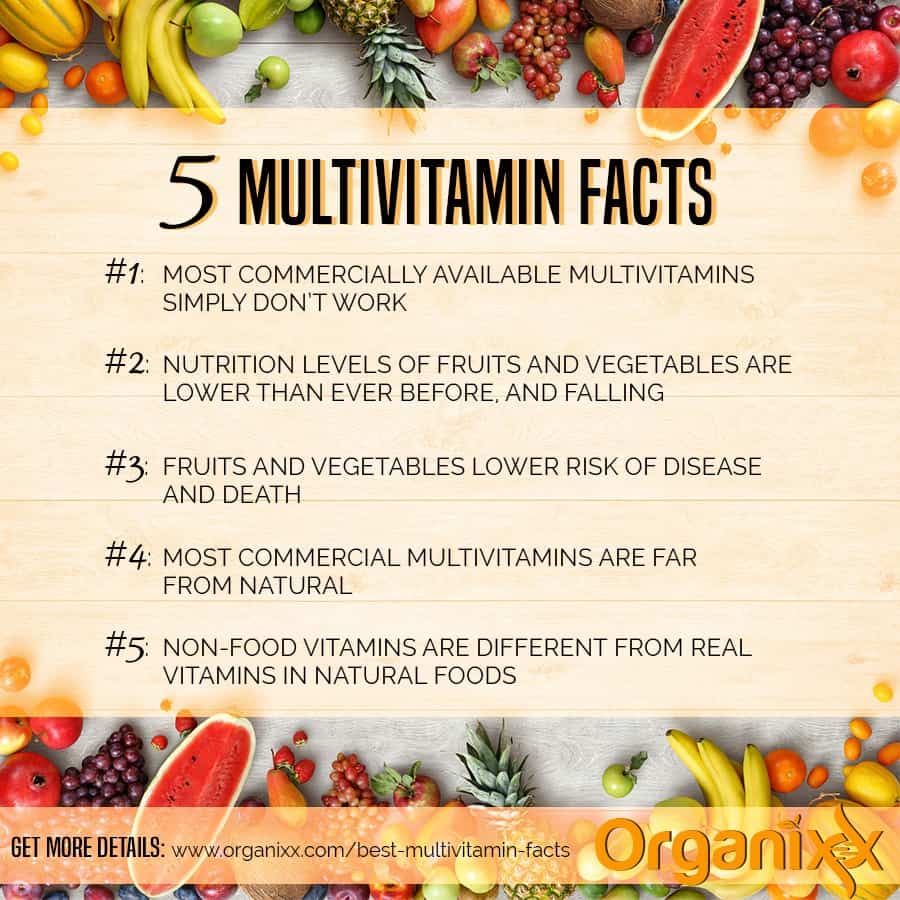
Fact #4: Most Commercial Multivitamins Are Far From Natural
The disturbing fact is that most commercially available vitamins today are as far from being the “natural organic substances that originate primarily in plants” as they can possibly be.
Believe it or not, most of the vitamins that you will find on supermarket and even drug stores shelves are produced from petroleum extracts, coal tar derivatives, chemically processed sugar, industrially processed fish oils. What’s worse, acids and industrial chemicals such as formaldehyde are used to make them [7]!
Did you know that manufacturers of petroleum-derived supplements label their products as “vegetarian” – not because they are from plants, but because they are NOT from animals?
Also, some brands of synthetic vitamins are labeled “organic” simply because they contain carbon!
The unpalatable fact is this: most so-called “organic vitamins” available today are not really organic from the true naturopathic, or even the U.S. government’s own perspective.
How then can they benefit your health the way real food vitamins do?
Fact #5: Non-Food Vitamins are Different from Real Vitamins in Natural Foods
 The physiochemical forms of many vitamins that are naturally present in real foods are very different from their synthetic versions, known as “analogs.”
The physiochemical forms of many vitamins that are naturally present in real foods are very different from their synthetic versions, known as “analogs.”
For instance, vitamin A is present in foods as retinyl esters and mixed carotenoids. However, synthetic vitamin A analogs include vitamin A acetate and palmitate, and isolated beta-carotene.
Similarly, the real food forms of vitamin C include two variants of ascorbic acid, as well as their salts and other derivatives. However, synthetic vitamin C is made up only of isolated, crystalline ascorbic acid.
In other words, most commercial (non-food based) vitamins are artificially prepared chemicals made from non-organic sources – and they are chemically and structurally different from the healthful vitamins present naturally in foods.
Not surprisingly, evidence suggests that food-sourced vitamins are better absorbed and used more easily by our bodies.
Our Bodies Know What to Do With Food
There are many reasons for this difference, including the fact that real food-sourced vitamins exist in forms which our bodies find easy to recognize and absorb; real food-derived vitamins have smaller particle sizes which leads to better absorption; and “co-factors” present in the same foods as real food-sourced vitamins seem to enhance their absorption because of mutual interactions.
Food-sourced vitamins are biological complexes containing multiple components. Functional vitamin absorption and activity can only happen when all the co-factors and components of the vitamin complex are present and working together synergistically in our bodies. Indeed, studies have confirmed that real food-derived vitamins are nutritionally superior.
What’s the Ideal Multivitamin Supplement?
Our bodies have been designed to absorb and use vitamins, present in real foods as multi-component complexes that are synergistically interconnected with other nutrients, co-factors, and healthful elements present in natural foods.
Unfortunately, most of us today consume mega-doses of isolated pharmaceutical-grade vitamins, which are synthesized, standardized, isolated chemicals that are very rarely made from natural sources, if at all. Many of these synthetic vitamin analogs are simply not capable of performing vitamin-like biological activities in our bodies such as building bone strength – and may even be toxic at higher levels [8,9]!
In fact, most commercially available multivitamin supplements can best be described as nothing more than a jumbled assembly of many ill-fitting parts, an ineffective combination of metals and inorganic chemicals that accomplishes very little by way of health benefits.
Even if you take vitamins that have been extracted and purified from natural foods, they will simply not be as effective, since they have been separated from the other essential components of their functional complex.
In summary – as an educated consumer you need to be aware that an ideal multivitamin supplement should contain the entire intact vitamin complex with all the co-factors and essential trace minerals necessary for the given vitamin to function synergistically in our bodies in terms of its bioavailability, efficacy, and safety.


